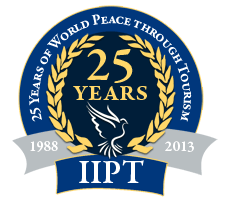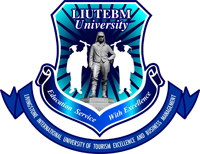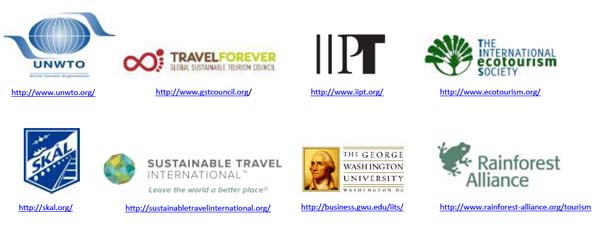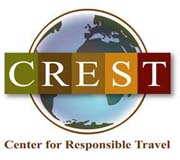IIPT Begins 25th Anniversary Year with launch of Consortium of Collaborating Universities
President Finnbogadottir two years earlier had hosted the Reykjavik Summit of which historians have said “was the most remarkable summit ever held between U.S. and Soviet leaders. President Ronald Reagan and Soviet General Secretary Mikhail Gorbachev seriously discussed the elimination of all ballistic missiles held by their two countries and aired the possibility of eliminating all nuclear weapons.” It was the beginning of the end of the Cold War. The IIPT 1988 Vancouver Conference introduced for the first time the concept of ‘Sustainable Tourism’ – four years prior to the Rio Summit in 1992. IIPT went on to develop the world’s first Code of Ethics and Guidelines for Sustainable Tourism in the year following the Rio Summit – and the first international study on ‘Tourism and the Environment: Models of Best Practice’ which was conducted for UNEP. IIPT is now planning to launch a series of innovative projects as a legacy of its 25th Anniversary year. IIPT Consortium of Collaborating Universities (IIPT-CCU) With its First Global Conference and since - IIPT has been promoting a “Higher Purpose of Tourism” that includes the key role of travel and tourism in: - Promoting international understanding and collaboration among peoples and Nations; - Protecting the environment and preserving biodiversity; - Enhancing cultures and valuing heritage; - Sustainable development; - Poverty reduction; and - Healing wounds of conflict and reconciliation through tourism, culture and Sport.
Member universities in the IIPT – CCU will collaborate in the conduct of research by their students on these and other dimensions of ‘Peace through Tourism.”
Over the years, beginning with Vancouver and since, our conferences/summits, and two of our Declarations resulting from conferences/summits – have emphasized the importance of drawing on the “ancient wisdoms, knowledge and values of Indigenous Peoples.” The area of research in our first year therefore will be on the topic “Methods of conflict resolution and reconciliation in the ancient traditions of Indigenous Peoples” and will be conducted by students of our charter member universities – each student researching a different tribal tradition.
In future years – universities will nominate research topics.
Student papers, not to exceed 2,500 words should be submitted to IIPT not later than 15 May 2013. A selection of the best papers will be published.
Universities Welcome
IIPT-CCU will be centered at Livingstone International University of Tourism Excellence and Business Management (LIUTEBM), Zambia. |
|||
IIPT Mourns the Tragic Death of Roger Payne Recipient of IIPT Ambassador for Peace Award
Roger was presented with the IIPT Ambassador for Peace Award at the IIPT Second Global Summit in Geneva 2003 for his leadership in promoting ‘Peace through Sport’ particularly his participation in the International Union for Conservation of Nature (IUCN) and International Mountaineering and Climbing Federation (UIAA) summit team climb in recognition of the UNESCO World Heritage status for the Jungfrau-Aletsch-Bietschhorn region. This was the first time mountaineers from India and Pakistan joined together in a climbing team – and the first time flags of the two nations were flown together from a summit. The summit team climb supported the Siachen Glacier Transboundary Peace Park between India and Pakistan. Other summit team members were Harish Kapadia and Mandip Singh Soin from India;Sher Khan and Nazir Sabir from Pakistan; Julie Ann Clyma from UIAA; and Jamie Andrew –a quadruple amputee from Scotland.
Roger held a number of positions with the British Mountaineering Council (BMC) including General Secretary and later Sports and Development director at the International Mountaineering and Climbing Federation (UIAA} where he was involved in a wide range of initiatives. He took great pleasure and pride in being able to combine his development work and his passion for climbing with projects such as helping remote mountain villages get access to micro-hydroelectricity. Roger worked with the Aga Khan Rural Support Programme (AKRSP), the United Nations Environment Program (UNEP), the World Conservation Union (IUCN) and the World Commission for Protected Areas (IUCN-WCPA). His projects included increasing benefits to local communities from tourism; raising awareness about the impact of climate change in the Himalayas; promoting mountain peace parks; and an end to the Siachen Glacier conflict on the border of India and Pakistan.
| |||
Demand for Responsible Travel Strong, Growing, and Profitable
A new meta-analysis of dozens of recent tourism surveys and market studies finds “increasing recognition among both travel professionals and consumers of the importance of responsible travel.” The analysis by the Center for Responsible Travel (CREST), a nonprofit organization headquartered in Washington, DC and affiliated with Stanford University, also finds “strong evidence” that responsible travel is “good for the economic bottom line.”
CREST’s study, The Case for Responsible Travel: Trends and Statistics, examines a wide range of surveys and studies done in the past five years to assess commitment to responsible travel, that is, “travel that minimizes negative impacts, brings economic benefits to host communities, and preserves the cultural and natural resources of the destinations.” For instance, a groundbreaking Harvard Business School study found that companies that adopted environmental, social, and governance policies in the 1990s outperformed those that did not, while a Nielsen survey found that 66% of consumers globally prefer to buy products and services from companies that have implemented programs to give back to society. This definitely extends to travel: 93% of Conde Nast Traveler readers said that travel companies should be responsible for protecting the evironment.
CREST’s findings coincide with two important milestones in the growth of the travel industry: for the first time ever, international tourist arrivals surpassed one billion in 2012 and international tourism receipts exceeded $1trillion in 2011. According to the CREST analyses, tourism industry growth is being matched by growing interest in responsible travel among both leisure and business travelers as well as travel businesses and tourism destinations.
“Over the last decade, CREST has periodically conducted similar analyses of tourism trends and statistics. Never before has there been such an abundance of evidence demonstrating that socially and environmentally responsible travel has now entered the mainstream. It crosses age and income groups, different types of tourism, and destinations around the globe,” says CREST Co-Director Dr. Martha Honey.
While the new CREST study draws heavily upon recent studies and surveys conducted in the United States, it also cites findings from other countries, including Russia, Namibia, Botswana, New Zealand, Costa Rica, Germany, U.K., and elsewhere in Europe and the Americas. Further, it notes a range of life style shifts and preferences that reinforce a growing trend towards responsible travel. These include urbanization and a need to connect with nature, consumer demand for authenticity and experiential tourism, a search for fulfillment, inter-generational travel, and a growing interest in volunteer vacations and travelers’ philanthropy.
“The tourism sector is embracing responsible tourism not as an option, but as a condition for its continuous growth,” states Luigi Cabrini, the World Tourism Organization’s Director for Sustainable Development. He adds, “Recent United Nations research highlights that investing in sustainability reduces costs of energy, water, and waste and enhances the value of biodiversity, ecosystems, and cultural heritage, while responding to increasing demand from travelers for greener tourism. The empowerment of local communities, poverty reduction and new, additional jobs also result from more responsible tourism approaches, spurring tourism’s contribution to broader development goals.”
The CREST study is endorsed by the World Tourism Organization (UNWTO), International Institute for Peace through Tourism (IIPT), Skal International, and five other leading tourism organizations.
Excerpts from The Case for Responsible Travel: Trends and Statistics (Click here for the full report)
The 2012 National Travel & Tourism Strategy of Americans traveling abroad found, “Nature-based, culture-based, heritage and outdoor adventure travel represent a significant segment of the outbound tourism market,” totaling about half or some 10 million U.S. travelers.
Two thirds (66%) of consumers around the world say they prefer to buy products and services from companies that have implemented programs to give back to society, according to a 2012 Nielsen Wire survey.
“When it comes right down to it, sustainability pays. And it pays in three ways: guests are increasingly interested, so it’s good for business; there are real opportunities to reduce costs and do things that are ‘green’ at the same time; and … the ability to get people excited about the company they’re a part of through the kinds of green practices we’ve been implementing is another source of success and payoff. ” —Frits van Paasschen, CEO, Starwood.
“Today’s consumers expect travel companies to build sustainability into their product offer. A majority of 70% believe companies should be committed to preserving the natural environment and 55% fair working conditions, while 75% of consumers want a more responsible holiday,” according to a 2012 U.K. report by The Travel Foundation and Forum for the Future.
A groundbreaking 2011 study by the Harvard Business School found that companies that adopted environmental, social, and governance policies in the 1990s outperformed those that did not. “Adoption of these policies is not just cheap talk; rather these policies reflect substantive changes in business processes,” the study states.
Ecotourism can return as much as 95% of revenues to the local economy, compared to only about 20% for “standard all-inclusive package tours,” according to a 2011 UN-supported study by the Collaborative Partnership on Forests. “The buildup of consumers’ socio-environmental awareness of tourism development,” states the UNWTO, “is leading to increased scrutiny on the part of the public in destination decision-making and a growing requirement for new tourism developments to be sustainable.”
“The buildup of consumers’ socio-environmental awareness of tourism development,” states the UNWTO, “is leading to increased scrutiny on the part of the public in destination decision-making and a growing requirement for new tourism developments to be sustainable.” |
|||
About IIPT The International Institute for Peace through Tourism (IIPT) is a not for profit organization dedicated to fostering travel and tourism initiatives that contribute to international understanding and cooperation, an improved quality of environment, the preservation of heritage, and poverty reduction; and through these initiatives, helping to bring about a peaceful and sustainable world. It is founded on a vision of the world’s largest industry, travel and tourism – becoming the world’s first global peace industry; and the belief that every traveler is potentially an “Ambassador for Peace.” For more information: |
|||
|
eTurboNews
is
proud to be the sponsor for this IIPT
Newsletter |

 IIPT will be commemorating the twenty-fifth Anniversary of its First Global Conference: Tourism – A Vital Force for Peace this year. The Conference held in Vancouver 1988 brought together 800 delegates from 67 countries with video-taped messages from Pope John Paul II and President Ronald Reagan featured in the Opening Ceremony. Honorary Chairman of the Conference was H.E. Vigdis Finnbogadottir, President of Iceland – the first elected woman Head of State in the world.
IIPT will be commemorating the twenty-fifth Anniversary of its First Global Conference: Tourism – A Vital Force for Peace this year. The Conference held in Vancouver 1988 brought together 800 delegates from 67 countries with video-taped messages from Pope John Paul II and President Ronald Reagan featured in the Opening Ceremony. Honorary Chairman of the Conference was H.E. Vigdis Finnbogadottir, President of Iceland – the first elected woman Head of State in the world.




 IIPT was saddened to recently learn of the tragic death of Roger Payne, who was killed in an avalanche this past summer on Mont Maudit in the Chamonix region of France along with eight other climbers.
IIPT was saddened to recently learn of the tragic death of Roger Payne, who was killed in an avalanche this past summer on Mont Maudit in the Chamonix region of France along with eight other climbers. 



